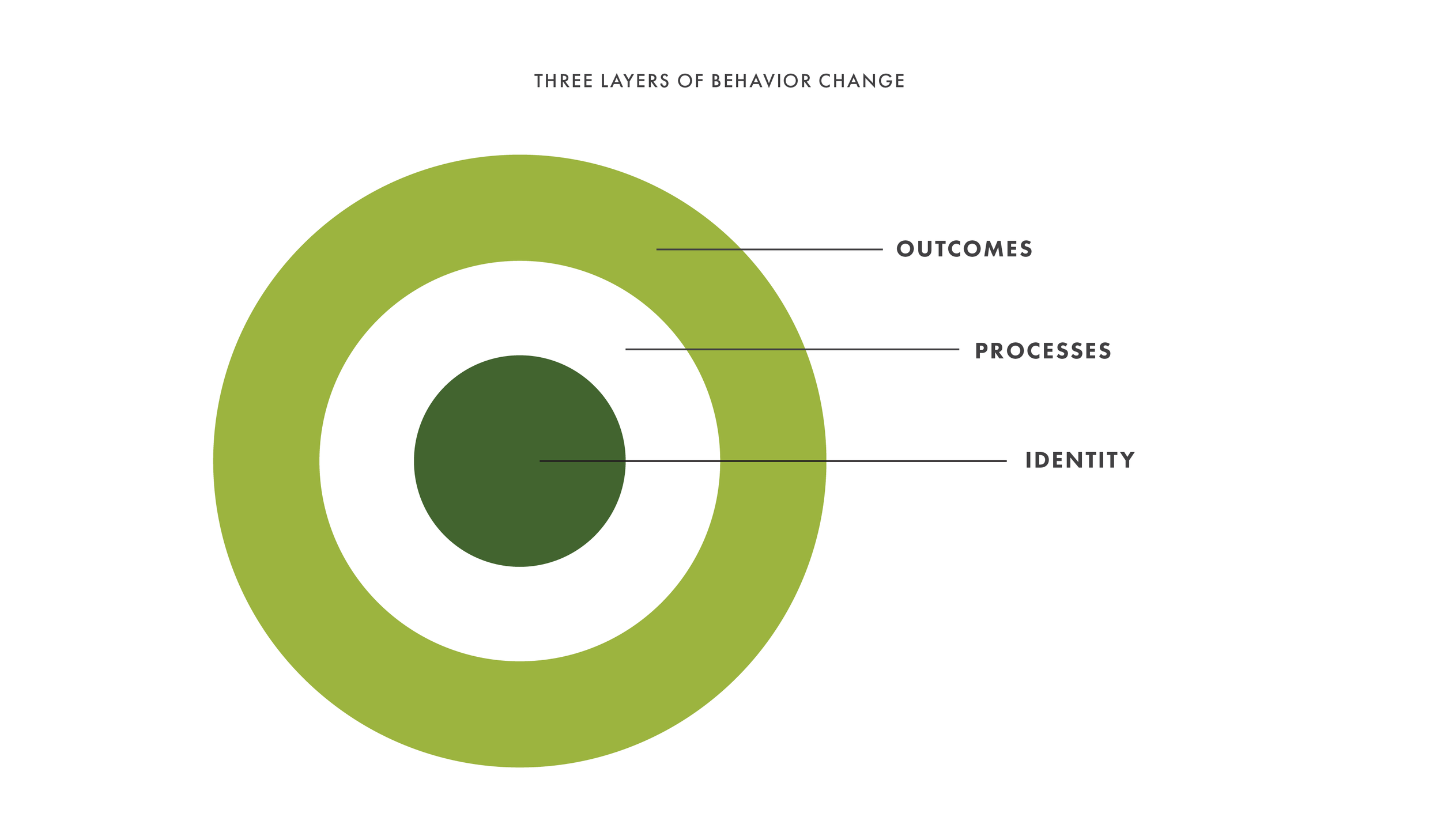This week's Atomic Habit insights...
Few things can have a more powerful impact on your life than improving your daily habits, so then why does it often feel so difficult to keep good habits going for more than a few days?! And why is it that once your habits are established, they seem to stick around forever, especially the unwanted ones!?
Changing our habits is challenging for two reasons:
We try to change the wrong thing.
We try to change our habits in the wrong way.
This week we're going to address the first point, in the coming love letters we'll address the second.
Our first mistake is that we try to change the wrong thing. Consider that there are three levels at which change can occur.
The first layer is changing your outcomes.
This level is concerned with changing the result like losing weight or publishing a book. Most of the goals you set are associated with this level.
The second layer is changing your process.
This level is concerned with changing your habits and systems - implementing a new grocery shop and meal prep routine, decluttering your desk for a better workflow, developing a meditation practice. Most of the habits you build are associated with this level.
The third and deepest layer is changing your identity.
This level is concerned with changing your beliefs, your worldview, your self-image, your judgments about yourself and others. Most of the beliefs assumptions and biases that you hold are associated with this level.
Outcomes are about what you get.
Processes are about what you do.
Identity is about what you believe.
When it comes to building habits that last, the problem is not that one level is better or worse than another, all levels of change are useful in their own way. The problem is the direction of change. Many people begin the process of changing their habits by focusing on what they want to achieve. This leads to outcome-based habits. The alternative is to build identity-based habits and focus on who we wish to become.
Imagine two people resisting a cigarette. When offered a smoke, the first person says, "No thanks. I'm trying to quit." It sounds like a reasonable response, but this person still believes they are a smoker, who is trying to be something else, they are hoping their behaviour will change while carrying around the same beliefs. The second person declines by saying, "No, thanks. I'm not a smoker." It's a small difference, but this statement signals a shift in identity. They no longer identify as someone who smokes.
Most people don't even consider identity change when they set out to improve. They just think I want to be skinny (outcome), and if I stick to this diet, then I'll be skinny (process). They set goals and determine the actions they should take to achieve those goals without considering the beliefs that drive their actions.
Behind every system of actions are a system of beliefs. Whether we are discussing individuals, organizations, or societies, there are a set of beliefs and assumptions that shape the system and identity. You may want more money, but if your identity is someone who consumes rather than creates, then you'll continue to be pulled towards spending, rather than earning. You may want better health, but if you continue to prioritize comfort over accomplishment, you'll be drawn to relaxing, rather than training.
It's hard to change your habits if you never change the underlying beliefs that led to your past behaviour. Without changing your beliefs, you can have amazing goals and bulletproof plans, but you haven't changed who you are and thus sustainability will always be an obstacle.
True behaviour change is identity change. You might start a habit because of motivation, but the only reason you'll stick with one is that it becomes part of your identity. Anyone can convince themselves to practice yoga or eat healthy once or twice, but if you don't shift the belief behind the behaviour, then it is hard to stick with the long term changes.
Improvements are only temporary... until they become part of who you are. The goal is not to read a book, the goal is to become a reader. Your behaviours are usually a reflection of your identity. What you do is an indication of the type of person you believe you are either consciously or non consciously. Research has shown that once a person believes in a particular aspect of their identity, they're more likely to act in alignment with that belief.
After all, when your behaviour and your identity are fully aligned, you are no longer pursuing behaviour change, you are simply acting like the type of person you already believe yourself to be. Like all aspects of habit formation, this too is a double-edged sword.
Many people walk through life in a cognitive slumber blindly following the norms attached to their identity. This includes (but is by no means limited to) beliefs like:
I'm terrible with directions...
I'm not a morning person...
I'm bad at remembering people's names...
I'm always late...
I'm not good with technology...
When you have repeated a story to yourself for years, is easy to slide into these mental grooves and accept them as a fact. In time, you begin to resist certain actions because that's "not who I am." There's internal pressure to maintain your self-image, and behave in a way that is consistent with your beliefs, you find whatever way you can to avoid contradicting yourself. The more deeply a thought or action is tied to your identity, the more difficult it is to change. It can feel comfortable to believe what your mass cultural beliefs are, or to do what upholds your personal identity, even if it's wrong or out of alignment with what you want to be true for you.
The biggest barrier to positive change is identity conflict. Good habits can make rational sense, but if they conflict with your identity, you will fail to put them into action. On any given day, you may struggle with your habits because you're too busy, too tired, too overwhelmed, or hundreds of other reasons...
However, the real reason you fail to stick with habits, is that your self-image gets in the way.
This is why you can't get too attached to one version of your identity. Progress requires unlearning. Becoming the best version of yourself requires you to continuously edit your beliefs, and to upgrade and expand your identity. So -
Where did your beliefs come from in the first place?
How exactly is your identity formed?
And how can you emphasize new aspects of your identity that serve you and gradually erase the pieces that hinder you?
Introducing James’ two-step process to changing your identity:
Your identity emerges out of your habits. You are not born with preset beliefs. Every belief, including those about yourself, is learned and conditioned through experience. Your habits are how you embody your identity.
When you make your bed each day, you embody the identity of an organized person.
When you write each day you embody the identity of a creative person.
When you exercise each day, you embody the identity of an athletic person.
Whatever your identity is right now, you only believe it because you have proof of it.
If you go to church every Sunday for 20 years you have evidence that you are religious.
If you meditate every night before bed for 20 minutes, you have evidence that you are meditative.
If you commit to yoga 3x week, even when you're tired, you have evidence that you are committed to fitness.
The more evidence you have for a belief, the more strongly you will believe in it. As you repeat these actions, the evidence accumulates and your self-image begins to change. The effect of one-off experiences tends to fade away while the effect of habits gets reinforced with time, which means your habits contribute most of the evidence that shapes your identity.
In this way, the process of building habits is actually the process of becoming yourself. This is a gradual evolution. We do not change by snapping our fingers and deciding to become someone entirely new. We change bit by bit, day by day, habit by habit. We are continually undergoing micro evolutions of the self. If nothing changes nothing is going to change. Come back to the simple two-step process:
Decide the type of person you want to be.
Prove it to yourself with small wins.
What do you want to stand for? What are your principles and values? Who do you wish to become?
These are big questions, and many people aren't sure where to begin. But they do know what kind of results they want to get such as feel less anxious, to own a home or be vocationally fulfilled. That's fine, start there and work backwards from the results you want to the type of person who could get those results. Ask yourself, "Who is the type of person that could get the outcome I want?" Who is the type of person that could lose 15 pounds? Who is the type of person that could write a book? Who is the type of person that could...
Well, it's probably someone who is consistent and reliable.
So now your focus shifts from writing a book (outcome-based) to being the type of person who is consistent and reliable to the practice of writing (identity-based). Once you have a handle on the type of person you want to be, you can begin taking small steps to reinforce your desired identity.
The concept of identity-based habits is our first introduction to another key theme in this book - feedback loops. Your habits shape your identity, and then your identity shapes your habits, it's a two-way street. The formation of all habits, is a feedback loop, a concept we will explore in the coming love letters, but it is important to let your values principles and identity drive the loop, rather than your results.
The focus should always be on becoming that type of person, not getting a particular outcome. So the true question is -
Are you becoming the type of person you want to become?
The first step is not what or how, but you need to know who you want to be. Otherwise, your quest for change is like a boat without a rudder.
You have the power to change your beliefs about yourself, your identity is not set in stone. You have a choice in every moment. You can choose the identity you want to reinforce today with the habits you choose today. And this brings us to the deeper purpose of the KIND 6-week challenge and the real reason habits matter.
Building Better Habits isn't about littering your day with life hacks. It's not about writing gratitudes in your journal every night or taking a cold shower each morning. It's not about achieving external measures of success like losing weight or reducing stress. Certainly, habits can help you achieve all of these things. But fundamentally, they're not about having something they're about becoming someone.
Ultimately, your habits matter, because they help you become the type of person you wish to be. They're the channel through which you develop your deepest beliefs about yourself... quite literally, you become your habits. We'll continue to explore this more next week…



